The Ministers of Millisle Congregation.
It will be seen from the foregoing account that, during a period of one hundred and sixty years, there have been seven ministers of Millisle. Of these seven, the last two have been ministers of the United Congregation of Millisle and Ballycopeland. It is interesting to note that all, with the exception of the Rev. Alexander Grier, remained at Millisle, after being ordained or installed there, for the remainder of their lives. Taking them in order of their time in ministry in Millisle, the following pages consist of a brief record of the life and work of each of the ministers of the Congregation. An account is also given, in some cases more fully than in others, of their families and descendants and relatives.
The Rev. ALEXANDER GRIER.
The Rev. Alexander Grier was the first minister of Millisle Presbyterian Congregation. He was not, however, regularly ordained or installed to the work of the ministry in this Congregation. Having been called unanimously to the Congregation of Ballycopeland, he was requested by the members of Millisle to undertake in addition the work of the pastorate of their congregation. This he willingly did, as long as he was minister of Ballycopeland,i.e., from 1773 to 1777. The Millisle Baptismal Register commences with this statement: "Register of Baptisms in the Presbyterian Congregation of Millisle. Children baptized by the Revd. Alexander Grier, First Minister, and connected with the secession Church." The first baptism recorded in the register is that of Thomas M'Keag, son of Andrew M'Keag, in the townland of Ballybuttle, who was baptIzed on the 28th day of September, in the year 1773. During his four years of ministry in Millisle, Mr. Grier baptized thirty-one children in connection with this Congregation, and the Register records the baptisms, ending his period of duty with the very brief note:-- "Baptized by A. Grier, 31."
Mr. Grier's position with regard to the Presbyterian Congregation of Millisle during the time of his ministry there was thus a most unusual one. He was minister at the same time of the Secession Congregation of Ballycopeland. As he was a Secession minister, and regularly installed as such in Ballycopeland, and further record of his life and work and relationships belongs to the account of the ministers of Ballycopeland Congregation, and will be found in connection with it.
The Rev. ANDREW GREER.
The Rev. Andrew Greer was the second minister of Millisle Presbyterian Congregation. He was a son of Mr. William Greer, a farmer residing at Carland, near Dungannon, Co. Tyrone. He was born in the year 1733, and he entered Glasgow University in 1761. He was licensed as a probationer for the ministry by the Presbytery of Tyrone in 1765. Brought up in connection with the congregation of Carland, he attended as the representative elder of that congregation the meeting of the General Synod of Ulster held at Armagh on 25th June, 1776. It was at that time the custom for the members of a congregation to elect and have ordained as a member of Session any student for the ministry, or any licentiate, belonging to the congregation. Acting as a ruling elder in his own congregation, and attending as representative elder the meetings of Synod and Presbytery, the student or licentiate thus acquired experience which was most helpful and beneficial to him when he was later ordained as the minister of a congregation.
Mr. Greer was ordained in Millisle on 20th May, 1777, by the Presbytery of Belfast. After a happy and quiet yet fruitful ministry of thirty-two years, he retired from the active duties of the pastoral charge in 1809. He died on 6th April, 1819, "leaving neither widow nor family." His wife was Miss Jane Allen, second daughter of Mr. William Allen, of Innishargie, and sister of Mr. William Allen, of Nunsquarter, Kircubbin, Co. Down. She died on 3rd October, 1806, aged fifty-two years. The mortal remains of Andrew Greer were interred beside those of his wife in Ballyhalbert Graveyard, in the portion of the burying-ground occupied by the Allen family.
The Minute Book of the Session of Millisle Congregation pays a tribute to Mr. Greer's life and work in the following words: "The Reverend Andrew Greer was born of pious and respectable parents. After receiving a Classical and collegiate education he was licensed to be a preacher of the Gospel by the Presbytery of Tyrone, sometime about the year 1765. For nearly twelve years he continued to be a probationer, and among the ministers of his acquaintance he was distinguished and known by the name of Honest Andrew. On the first March, 1777, he commenced preaching on trials in Millisle, and having received from it a call that was perfectly unanimous, he was ordained to the ministerial office on the 20th May following. He died in the forty-third year of his ministry. Total number of children baptized by the Rev. Andrew Greer in the Congregation of Millisle, one thousand one hundred and forty-three."
The "Belfast News-Letter," in its issue of Tuesday, 13th April, 1819, contains the following announcement of the death of Mr. Greer: "Died on Tuesday, the sixth April, 1819, in the eighty-sixth year of his age and the forty-third year of his ministry, the Rev. Andrew Greer, of Millisle. Few ministers have ever maintained a character more suited to their sacred profession. In him his people found a Teacher, a Comforter, a Counsellor, and a Friend. His life was a living comment on the practicability of his instructions, and both by his actions and his words he taught righteousness and truth. He was religious without austerity or ostentation, the cheerful companion and the faithful friend.
'Of Humour easy, and of Life unblamed,
The Friend delighted, while the Priest reclaimed.'
He was a man of the strictest honesty and integrity, who hated dissimulation and a lie. In a word, he was respected by all who knew his worth, and as he was righteous in his generation, his name shall be had in everlasting remembrance. 'Blessed are the dead which die in the Lord from henceforth; yea, saith the Spirit, that they may rest from their labours, and their works do follow them.'"
The Rev. JOHN WALKER, M.A.
The Rev. John Walker, M.A., was the third minister of Millisle Presbyterian Church. He was born in the year 1785, and was eldest son of Mr. Robert Walker, a farmer who resided in the parish of Drumbo, near Lisburn. He entered Glasgow University in 1805, and obtained the degree of Master of Arts in 1808. He completed his theological course in 1809, and was licensed to preach the Gospel as a probationer for the Christian ministry in the same year. He was ordained as minister of Millisle by the Presbytery of Belfast on 13th April 1810. He was most successful as a minister, and was greatly beloved by all the members of a loyal and devoted congregation, for the short period of four years. At the end of this time he was brought into conflict with the Presbytery of Belfast, and with the General Synod of Ulster, as a result of an irregular marriage at which he was the officiating minister. Mr. Walker's action was condemned by the Synod, and as a consequence he ceased to be minister of Millisle Congregation on 30th June, 1814.
Mr. Walker retained his residence in Ballymacruise, while he returned to Glasgow University to study medicine. In 1816 he commenced to practise as a doctor in Ballymacruise and district, returning at intervals to Glasgow until the completion of his medical course in 1820, when he obtained the C.M. (Master of Surgery) degree. He conducted also a private school for a number of years at his residence. He had a large practice as a doctor, and as a teacher he attracted pupils from a wide district. Many of these pupils attained places of distinction in later years, and each and all regarded Dr. Walker as their leader and first guide into those ways of knowledge and of achievement in which they afterwards walked so worthily. The most distinguished pupil of Dr. Walker's school was the Rev. Robert Maxwell Hanna, and teacher and pupil remained always on terms of the closest friendship. The writer has before him a gift from the older friend to the younger. This is an iron pike head, made by a local blacksmith, and it was most probably used by a local member of the United Irishmen, in the rebellion of 1798. The pike head has a card attached to it, and it bears the following message, in the Rev. John Walker's handwriting:-- "This Arrow Head was found by Big Archy Simpson, in Ballyhay Bog, seven feet below the surface. Said Archy gave it to John Walker who sends it to his friend, Robert Maxwell Hanna, as a small token of his great esteem. 1838.
N.B. -- Judge not of the respect of the donor by the value of the gift. J. Walker, Millisle.Dec., 1838."
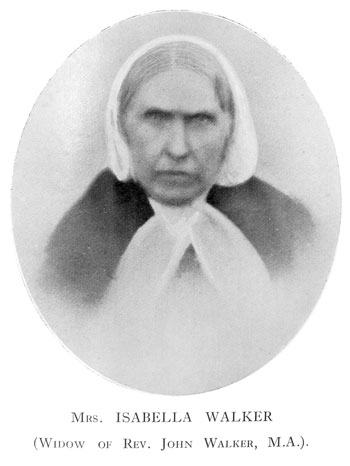
As a teacher the Rev. John Walker was well endowed and gifted. His knowledge of Latin was very exact and profound. He also excelled in mathematics, and he was a brilliant English scholar. A second relic of the past, lent to the writer by a friend, shows that the Rev. John Walker could be severe as a critic of what he considered imperfect English. This relic is a manuscript sermon of the Rev. Andrew Greer, of Millisle. It consists of fifteen closely-written pages. On a blank page at the end is the following comment in the Rev. John Walker's handwriting: "This sermon was written by the Rev. Andrew Greer, in the year of our Lord, 1767. It is greatly defective in orthography, punctuation, and orthodoxy. But it discovers the charity and piety of the writer. In some places the author seems unacquainted with the language he uses. In others one part contradicts another. No doubt in a few years this sermon would be a very agreeable present to any Museum in the European part of the world. J. Walker, Millisle. 4th March, 1814."
The criticism is as amusing as it is severe. It shows the straightforwardness and brilliance of the critical scholar, who could have little patience with anything imperfect in literary composition.
As a talented minister, surgeon, and teacher, the Rev. John Walker was greatly esteemed and respected in Millisle and its neighbourhood. He had many friends, and he loved and understood in a most sympathetic way all the people of the district. His kindness was known to all, but especially to the poor, to whom he was always most attentive and generous.
The Rev. John Walker married Miss Isabella Boyle, of Drumfad. Their family of ten children were as follows:--
1. Robert Boyle Walker, the eldest child of Rev. John and Mrs. Walker, was born at Ballymacruise on 13th February, 1813. He served an apprenticeship as a sailor, attaining the rank of master mariner, and finally that of captain. On one of his voyages he had his brother Samuel with him, the latter acting as mate. On this voyage Samuel was drowned, and Robert suffered so severely from the shock and grief occasioned by the death of his brother, that he could never go to sea again. He then purchased a vessel, which he used for the purpose of bringing coals to Donaghadee, where he sold them. When about seventy years of age he retired from business, and bought a, house situated near to the road leading from Millisle to Donaghadee, where he died, aged eighty-seven years. He was married three times, his first wife being Miss Margaret Boyle of Ballyfotherly, who died in 1852, aged thirty-three years. His second wife was Miss Margaret Kelly, of Donaghadee, who died in 1863, aged twenty-six years. His third wife was Miss Ann Cochrane, of Donaghadee, who died in 1900, aged seventy-six years.
2. John Walker, the second child of the Rev. John Walker, was born at Ballymacruise on 14th July, 1814. He remained at the old home and worked his father's farm. He married Miss Margaret M'Keag, of Millisle, and they had a family of eight children -- Samuel, Isabella, Margaret, Jane, Mary, Robert, Hugh, and Anne. He died on 23rd September, 1894, and his wife died on 21st March, 1907. Their mortal remains were interred in Donaghadee Churchyard.
3. Jane Campbell Walker, third child of Rev. John Walker, was born at Ballymacruise in 1816. She married Mr. James Campbell, of Ballymacruise, and she died on 4th November, 1840.
4. William Walker, the fourth child of the Rev. John Walker, was born at Ballymacruise on 9th May, 1818. While a young man he was at sea for some time. He afterwards emigrated to the United States of America, and lived at Coal Valley, Rock Island, Illinois. He married Miss Elizabeth Campbell, of Ballyhaskin, in the U.S.A., and their eight children were born between the years 1852 and 1865. Their names were John Campbell, James Campbell, William Campbell, Samuel Campbell, Hugh Campbell, Robert, Sharmen, and Kate. Four of these children are now no longer alive. A brother of Mrs. William Walker is still living in U.S.A. His name is William Campbell, and he is the last survivor of the famous pony express riders who carried the mails from the Missouri River to California in 1859 and in 1860. He is now ninety-four years old. William Walker died at Coal Valley on 9th June, 1867. His wife died on 30th August, 1908, aged eighty years.
5. Samuel Boyle Walker, the fifth child of the Rev. John Walker, was born at Ballymacruise on 4th February, 1820. He was mate of a vessel named "The Emerald," of Donaghadee. This vessel belonged to his brother Robert, who also acted as captain. The vessel encountered a storm off the south coast of Sweden. During the storm Samuel was engaged in the rigging, shortening sails, when he was thrown into the sea, and the storm was so great that his brother was unable to save him, and could only watch him drown. He was unmarried, and met death by drowning on 19th September, 1844.
6. James Boyle Walker, the sixth child of the Rev. John Walker, was born at Ballymacruise in 1822. He emigrated to Coal Valley, Rock Island, Illinois, about the year 1850. He married Miss Mary Kelly, of Donaghadee. They had. a family of nine children, eight of whom are still living. Their names are:-- Isabel Ann, Agnes Jane (deceased), Eliza Cornelia, James Kelly, Francis Bailey, Hugh Kennedy, Mary Rebecca, Margaret, and William Robert. James Boyle Walker died on 27th December, 1891, and his Wife died on 30th October, 1903, aged seventy years.
7. David Carmichael Walker, the seventh child of the Rev. John Walker, was born at Ballymacruise on 15th September, 1823. He became a sailor, and was captain of his brother's vessel, "The Emerald," when this ship was lost, with captain and crew, in a storm at the entrance to a harbour on the Island of Bornholm, in the Baltic Sea. The bodies were all washed ashore, and were buried on the Island. David Carmichael Walker had married a Miss Kelly, of Donaghadee. She died when their only child -- a boy -- was four years old. The boy was born on 30th November, 1846, the day of his father's death. He was brought after his mother's death to his grandmother's home at Ballymacruise, where he died at the age of seven years.
8. Shannon Walker, the eighth child of the Rev. John Walker, was born at Ballymacruise on 17th September, 1826, and died seven years later. His mortal remains were probably interred in Templepatrick Cemetery, in the burying-ground of the Boyle family, as the family of the Rev. John Walker had no burying-ground nearer than Drumbo at that time.
9. Ann Shannon Walker, the ninth child of the Rev. John Walker, was born at Ballymacruise on 22nd July, 1827. She married Mr. John Adams, of Ballycopeland, and emigrated to Coal Valley, Illinois. She died when she had only been three weeks in America, leaving an infant child, a girl. She died of yellow fever, and the date of her death is unknown.
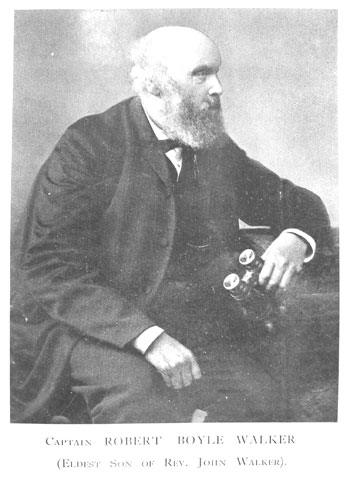
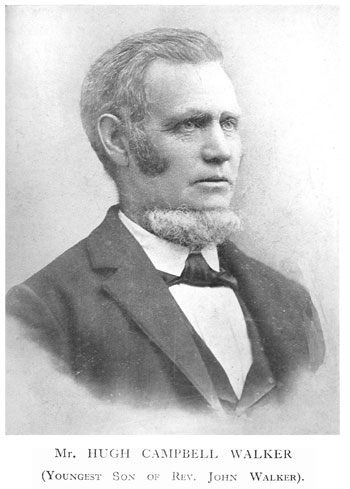
10. Hugh Campbell Walker, the tenth and youngest child of the Rev. John Walker, was born at Ballymacruise on 5th May, 1831. He went to Rock Island, Illinois, about 1850. After a few years he returned to Ireland, and then he went to Australia, in order to take part in the work of the gold fields in that country. He soon returned, however, to his native land, from which he went again to Rock Island, where he became a farmer. He married Miss Susanna Allely, a native of County Tyrone, and they had a family of eight children, whose names are:-- Mary Elizabeth, David, Annie, Isabel, Samuel Hugh, Ella Jane, Katherine, Carrie, and Cornelia. Four of these children are now no longer alive. Hugh Campbell Walker died on 1st May, 1907, and his wife died on 14th October, 1923, aged eighty-one years.
The following is a copy of the inscription on the tombstone erected to the memory of the Walker family in the Donaghadee Churchyard:--
|
"Erected to the Memory of
'The Baltic is a restless sea, |
Also his Son, David C. Walker, who was likewise lost with the 'Emerald,' on the Island of Bornholm, on 30th November, 1846, aged 23 years. Also his Wife, Isabella Walker, alias Boyle, who died 30th March, 1869, aged 83 years. Also his Son, John Walker, who departed this life 23rd September, 1894 aged 80 years. Also his Wife, Margaret Walker, who departed this life 21st March, 1907, aged 74 years."
The Rev. JOHN HANNA. M.A.
The Rev. John Hanna was the fourth minister of Millisle Congregation. He was a son of Mr. James Hanna, a Surveyor, and he was born near Hillsborough, Co. Down, on 16th November, 1784. He entered the University of Glasgow in 1806, and obtained the Degree of Master of Arts in 1810. He was licensed to preach the Gospel by the Presbytery of Dromore in 1810. He was brought up in connection with the Congregation of Anahilt, where he was ordained as a Ruling Elder. He attended the meeting of the General Synod of Ulster in Cookstown in June, 1814, as representative elder from Anahilt Congregation. He was ordained as Minister of Millisle Congregation on Tuesday, 2nd May, 1815. He retired from the active duties of the ministry in 1847, and died on 4th January, 1850.
On 4th October, 1817, the Rev. John Hanna was married to Miss Jane Maxwell (a daughter of Mr. Robert Maxwell, a farmer, who resided first at Ballyreagh, near Newtownards. He afterwards resided near Millisle, and was a member of Millisle Presbyterian Church). She died on 12th June, 1857, aged sixty-eight years. Her mortal remains were laid to rest beside those of her husband in Millisle Burying-ground.
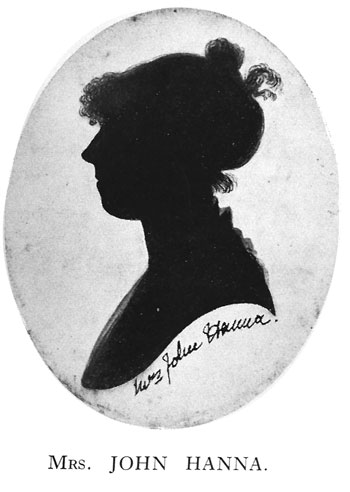
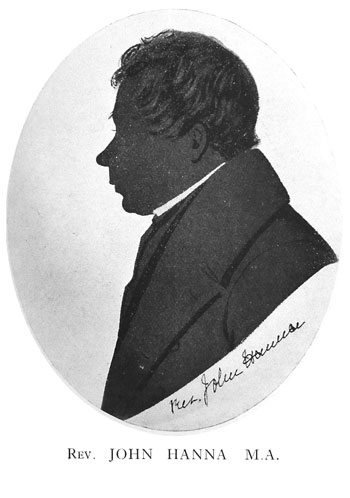
Mr. and Mrs. Hanna had a family of four children, all of whom were born in the townland of Island Hill, near Millisle. Soon after his ordination Mr. Hanna bought a farm at Island Hill. This farm is now owned by Mr. Robert Pritchard, but the house occupied as a residence by Mr. Hanna is in ruins. It is close to Mr. Pritchard's dwelling-house. Mr. Hanna afterwards purchased a farm in Ballyhaskin, where he resided until the time of his death. He built the residence occupied by him on this second farm. The farm in Ballyhaskin is now owned by Mr. David W. Campbell, who resides in the house built by Mr. Hanna.
The following is a brief account of the four children of the Rev. John Hanna, with some reference also to the members of their families:--
1. Jane Maxwell Hanna, the elder daughter of the Rev. John and Mrs. Hanna, was born in August, 1818. She married the Rev. Gilbert Jamison, who was minister of the Congregation of Glastry from 1839 to 1879. They had four daughters -- Jane, Mary, Sarah, and Eleanor. Miss Mary Jamison is the only surviving member of this family. She resides at 74, Donaghadee Road, Bangor, Co. Down. The Rev. Gilbert Jamison had three brothers. The eldest of these, Doctor David Jamison, entered the medical profession, and practised in Newtownards. His son and grandson have also entered the medical profession, and both of the latter are at present practising in Newtownards. The second brother of the Rev. Gilbert Jamison was Mr. James Jamison. He entered the business life of Newtownards, and his son became the Rev. David Jamison, of Second Newtownhamilton Church, Co. Armagh. The third brother was Mr. Robert Jamison, a farmer, who resided at Movilla, near Newtownards.
2. Sarah Hamilton Hanna, the younger daughter of the Rev. John and Mrs. Hanna, was born in February, 1820. She married Mr. Francis Boyle, of Ballyfotherly, Donaghadee, She left by her will a sum of money, the interest of which amounts to one guinea annually, for the upkeep and repair of the Hanna tombstone, and of the railings which surround the graves of her father and mother.
3. Robert Maxwell Hanna, the elder son of the Rev. John and Mrs. Hanna, was born on 10th December, 1821. He learned the rudiments of Latin from his father, and was afterwards a pupil at the private school of Doctor John Walker, of Ballymacruise, In 1836 he entered the Royal Academical Institution, Belfast. This Institution had been thrown open to the Synod of Ulster and the Secession Synod for the education of their theological students. In November, 1837, young Robert Maxwell Hanna entered the theological classes as a student for the ministry. His first prayer in the class of moral philosophy was for the recovery of Rev. Dr. Henry Cooke, who was then seriously threatened with lockjaw. He afterwards went to Edinburgh, where he completed his theological studies. He was licensed to preach by the Presbytery of Ards, on the 31st October, 1843. He was ordained as minister of the Congregation of Girthon and Anworth, by the Presbytery of Kirkcudbright, on 12th June, 1844. Anworth is the parish where the great Scottish divine, Samuel Rutherford, spent "nine of the happiest and busiest years of his life." It thus was sacred ground, and it was a great undertaking for young Mr. Hanna to commence his ministry in a place with such hallowed memories. He did well, however, for three years, and proved himself worthy of the great responsibility that devolved upon him. At the end of two years his health began to give way, and he was unable to continue longer than another year in Scotland. In 1847 he ceased his ministerial duties, owing to ill-health, and in 1848 he resigned his charge of Girthon and Anworth. He then went to Italy, and the Free Church of Scotland provided him with work as minister in the city of Florence, in January, 1850. Mr. Hanna's ministry in Florence was a famous one. He determined to instruct the people of the British Isles regarding the civil and religious condition of Italy. With this end in view he contributed articles to the "North British Review," the "News of the Churches," "Evangelical Christendom," the "Edinburgh Witness," and other periodicals and magazines. He had a fine literary style, and the articles mentioned were widelyread. He was also a most impressive preacher. English, Scottish, and American tourists thronged his Church, and supported his efforts to spread the cause of Protestantism in Italy. He was on terms of the closest friendship with many
of the most distinguished families in Florence. Robert Browning and his illustrious wife, Elizabeth Barratt Browning, were his friends and helpers in every good work. He translated the "Pilgrim's Progress" into Italian, became a recognised authority on Italian art and literature, and was one of the intellectual leaders of the land where ill health had forced him to dwell. He was, in addition, and above all other things, a great spiritual leader. The Tuscan Converts, the Waldenses, and the different members of the Protestant Churches in Italy, had each and all his active sympathy and strong support. He fought for them, prayed for them, and toiled for them, as very few had done, and he had an influence for good in a land of superstition that bore good fruit, bringing men out of intellectual and spiritual darkness into the light of the Divine truth and love and life.
He was eight years in Florence, and during all this time he suffered from pulmonary disease. He died at last of gastric fever, passing away on Saturday evening, 19th December, 1857. On the Tuesday following his mortal remains were interred in the Swiss Protestant Cemetery, at Florence. Mr. Robert Browning attended the funeral, performing the office of chief-mourner. His body was borne to the cemetery by those who knew and loved him best in far-off Italy. The coffin bore the inscription, "Robert Maxwell Hanna, aged thirty-six."
Such was the end of "the career of a distinguished Irishman. It is very affecting to think of its shortness and its fulness." After years of preparation and of earnest toil, it would have seemed that the foundation was laid, on which the building of a great and noble life might be reared. But it was ordered otherwise. In the Master's eyes his work was done, and well and fully done. "Robert Maxwell Hanna sleeps, far from the sounding shores of the Ards, under the clear skies of Italy, and there he will sleep till time shall be no more."
4. James Hanna, the younger son of the Rev. John and Mrs. Hanna, was born in July, 1823. He married a Miss M'Whinney, of Drumfad, and he and his wife went to America. They settled near the town of Rock Island, Illinois. They had eight children -- John, Robert, Charles, James, Eliza Jane, Sarah, Mary, and Margaret. James Hanna died on his farm at Coal Valley, Rock Island, Illinois, on 14th March, 1872, aged forty-eight years. The descendants of Mr. James Hanna still live near Rock Island. Their present address is Orion, Henry County, Illinois, U.S.A.
A large number of the manuscript sermons of the Rev. John Hanna still remain. They are in the possession of his grand-daughter, Miss Mary Jamison of Bangor. Miss jAmison also possesses manuscript sermons by the Rev. Robert Maxwell Hanna. She has in addition a very fine collection of silhouette portraits of the Hanna and Jamison families, and a beautiful marble bust of the Rev. Robert Maxwell Hanna, the work of an Italian sculptor.
The Rev. JOHN M'AULEY.
The Rev. John M'Auley was the fifth minister of Millisle. He was born at Drumgooland, near Rathfriland, in the year 1818. He was educated at the Royal College, Belfast, and received his General Certificate in Arts in 1843. He completed his theological course in 1845, and was Licensed to preach the Gospel as a probationer for the Christian ministry in the same year. Having received a unanimous call from the Congregation of Millisle, he accepted it, and he was ordained to the office of the ministry, as assistant and successor to the Rev. John Hanna, in Millisle Presbyterian Church, on 2nd March, 1848. His period of duty in Millisle was longer than that of any other minister of the Congregation. After forty-five years of honoured and faithful ministry he passed to his rest and reward on 18th September, 1893, aged seventy-five years.
When Mr. M'Auley began his ministry there were two services on each Sabbath in the Church. These services were held in the forenoon and afternoon, with a short interval between for refreshment. Mr. M'Auley soon altered this arrangement of the services. In a few years after his ordination he had united the two services so that the public worship of the Church consisted of one long service on each Sabbath, without an interval. As a preacher Mr. M'Auley was greatly gifted. He was at his best on each "Sacrament Sabbath," as the day was called on which the Sacrament of the Lord's Supper was observed. The very sacred and solemn manner in which he conducted the entire service is still remembered by all who survive of those to whom he ministered. The Sacrament of Baptism was, almost without exception, observed in the Church during Mr. M'Auley's ministry. At the administration of this Sacrament Mr. M'Auley addressed the parents in words that were not easily forgotten. The devoted pastor was wont to speak to the fathers and mothers in some such impressive words as these: "God has given you this precious gift of a little child. He is now speaking to you, and saying: 'Take this little one and train with loving and earnest care the life that is committed to your charge. Teach and guide this child, by word and example, the way in which he should go, so that when he is older, he may not depart from it.'" These words of the man of God sank deep into the hearts of those to whom they were addressed and those who heard them were the better for such messages of heaven for the ways and days of earth.
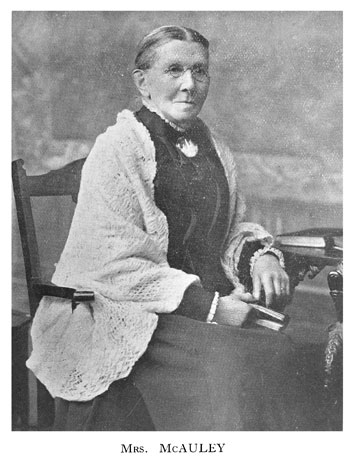
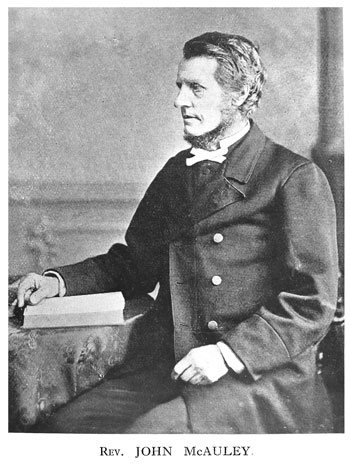
As a pastor Mr. M'Auley was beloved. His quick and ready sympathy, and his affectionate interest in the welfare of every member of his flock caused him to be regarded and esteemed, not only as a minister, but as a true and trustworthy friend. He was straightforward and swift of speech, and he did not fear to give his candid opinion on any subject, especially those subjects where moral issues were concerned.
"His words were true,
Like the kingly soil in which they grew,
The garden of his heart."
And like all true men, he was kind of heart.
The youngest children longed and loved to be noticed by him, and to have his word of kindly cheer, in all places where he went. The older members sought and found in him and in his words the comfort they needed, in their days of deep distress. Strong men admired and loved his strength of character. Those who were beaten on life's stern battleground were helped and encouraged by him. He was a friend to the poor and needy, and he understood in a wonderful way the wants and needs of all.
As a man he was a lover of the fields and of animals, and especially of horses. He visited the members of the congregation for the most past on horseback, and one faithful horse named Sheila, used by him for many years, is still remembered by the oldest members of Millisle Church. He taught the people, young and old, to love and reverence their Church, and to be proud of it too. An instance occurred, during the present year, which proved that his teaching is still bearing its good fruit. At the re-dedication and re-opening services, held after the renovation, most generous gifts were received from those who had been taught by a man now forty years departed, to give well to the House of God. He is gone from the ways of the earthly sanctuary these forty years, but the intense love he taught men and women to have and to hold for the things of God is still living still. Such a love for, and loyalty to, the place where prayer is wont to be made, left to live in the hearts of those who came under his influence and teaching, is a great and wonderful tribute to the work and word and worth of the Rev. John M'Auley.
Mr. M'Auley was a member of a family which has given many distinguished ministers to the Church. Two of these have been honoured by their brethren, being called to fill the highest place in the gift of our Church -- that of Moderator of the General Assembly. Mr. M'Auley's wife was also a member of a family which has held an honoured place in the community. She was Miss Elizabeth Catherwood, daughter of Mr. David Catherwood, of Donaghadee. On 12th November, 1851, the Rev. John M'Auley and Miss Catherwood were married, by special licence, in No. 10, Woodside Place, Glasgow, the minister officiating at the marriage being the brother of the bridegroom, the Rev. Matthew M'Auley, of Cahans Presbyterian Church, County Monaghan. Mrs. M'Auley was a lady of gentle and beautiful life. She was her husband's worthy helpmeet in all that he said or did in the best interests of the Congregation of Millisle.
Mr. and Mrs. M'Auley had eleven children, and the following is a brief account of the members of this large family:-
1. William, the eldest, died on 26th December, 1874, aged twenty-two years.
2. Thomas Brown, the second child of the family, died in August, 1863, aged three years.
3. David Catherwood, the third son, assisted his father by in working the farm on which the family resided in Ballycopeland. In order to augment his income the Rev. John M'Auley farmed in Ballycopeland a farm which had been in the possession of Mr. James Murdoch. He also purchased an adjoining farm, which had belonged to the Rev. John Hutton, minister of Ballycopeland Presbyterian Church, and on which Mr. Hutton had resided. A portion of this latter farm is still known as "Hutton's Hill." Both of these farms are now owned by Mr. Samuel Adams, of Ballycopeland. David Catherwood M'Auley died in March, 1888, aged thirty-four years. The death of this son led his father to give up farming, and to reside at the Manse. He soon afterwards sold his property in Ballycopeland to Mr. Francis Ewart.
4. Agnes Ann, the eldest daughter of the family, died young.
5. Sarah Jane, the second daughter, died on 3rd September, 1879, aged 23 years. She died of small-pox in a hospital in Dublin, and was buried in Mount Jerome Cemetery, Dublin. The Congregation of Millisle erected a stone to her memory in the cemetery, and a beautiful marble tablet in Millisle Church -- the first tablet to be thus erected in the Church.
6. Isabella, the third daughter, died in 1872.
7. Samuel, the fourth son, was engaged in business in Belfast until his death on 14th June, 1896, at the age of twenty-nine years.
8. Matthew, the fifth son, entered the medical profession, and practised at Hoylake, near Liverpool. He died of heart trouble at Bad-Nauheim, a watering-place in Germany where he had gone to have his health restored. His death at the age of forty-two years was sudden and unexpected. His mortal remains were interred in the cemetery at Bad-Nauheim.
9. Miss Susanna M'Auley, the fourth daughter of the family, resides at 6, Orient Gardens Cliftonville Road, Belfast.
10. Miss Margaret Catherwood M'Auley, the fifth daughter, was married to Mr. Francis Ewart, who had, as already stated, purchased her father's farm and residence in Ballycopeland. She is now a widow, and resides with her daughter, Miss Elizabeth Ewart, at Princess Gardens, Donaghadee.
11. Mr. James M'Auley, the sixth son and youngest member of the family, entered the banking profession. He is manager of the Ulster Bank, Bangor, Co. Down. Mr. M'Auley married Miss Margaret Millar Hill Rea, of Belfast. Their son, Mr. Jack M'Auley, was recently married to Miss Doris E. Young, of Bangor. They resided at "Leenane," 6, Shandon Drive, Bangor. The writer desires to place on record here his gratitude to Mr. and Mrs. M'Auley, and to their son and daughter-in-law, for all the assistance their friendship has meant to him in so many ways, and for all the information they have given, supplying him with many necessary facts and details regarding the history of the Congregation of Millisle.
The mortal remains of the Rev. John M'Auley, and of his wife, and six of their children, are interred in Donaghadee Churchyard. The following is the inscription on the family tombstone:--
|
"Interred Here
Also the Reverend John M'Auley,
And of his Children, William, David, Thomas, Agnes Ann, Isabella. |
Rev. SAMUEL JOSEPH LYONS, B.D.
The Rev. Samuel J. Lyons was the sixth minister of the Congregation of Millisle, and the first minister of the united Congregation of Millisle and Ballycopeland. He was a son of the late Mr. William Lyons, and he was born at Loughermore, near Limavady, County Londonderry, on 17th July, 1868. He was brought up in connection with Banagher Presbyterian Church, under the ministry in the first instance of Rev. Robert L. Rogers, and later of Rev. W. J. D. Williamson. He was educated at Limavady Intermediate School; at M'Crea-Magee College, Derry; and at Assembly's College, Belfast. He received the General Assembly's Certificate in Arts from M'Crea-Magee College in 1889, and on 5th May, 1892, he was licensed to preach as a probationer for the ministry by the Presbytery of Glendermott. On 4th January, 1893, he was ordained by the Presbytery of Banbridge as minister of the united Congregation of Scarva and Poyntzpass. His term of ministry in his first charge was a very brief one, lasting just one year. On the 23rd January, 1894, he was installed as minister in Millisle. Soon after his arrival in Millisle Mr. Lyons was married to Miss Caroline Emma Irvine, daughter of Rev. Thomas Irvine, his predecessor in Scarva and Poyntzpass. She was born on 12th June, 1869, and she died on 12th March, 1903. Their only child, William Irvine, was born on 17th May, 1898, and died on 13th March, 1899.
Mr. Lyons married again, his second wife being Miss Jeanette Craig, daughter of Mr. Robert James Craig, J.P., of Binnelly, Donemana, County Tyrone. Their elder son, Mr. Alfred Norman Lyons, was educated at Dungannon Royal School. A short time before his father's death he went to South Africa. He is at present at home as the result of a serious illness, from which he has satisfactorily recovered. Their second son, Mr. Samuel Edmund Craig Lyons, was at Campbell College, Belfast, before entering Queen's University, Belfast, where he is at present a medical student, nearing the completion of his course.
It would be difficult to describe fully and fairly the ministry of the Rev. Samuel J. Lyons. He was a very busy pastor always, constantly visiting the sick and afflicted, and regularly keeping in close touch with all the members of his flock. His kindness of heart was such that his visits were much appreciated, and many memories remain of his unfailing sympathy with those in sorrow or distress. He was a great reader and student of the best of books. He kept up his acquaintance with the subjects and studies of his College days, and he received in the year 1919 the Degree of Bachelor of Divinity from "The Presbyterian Theological Faculty, Ireland." His pulpit ministrations were marked by sound scholarship, careful preparation, and an understanding of the needs and lives, and the joys and sorrows, of all who occupied the high-backed pews of the quaintly beautiful old Church by the sea -- the Church he loved to the end. His first wife was kind of heart and much beloved. The death of her only child was too great a loss for her to bear, failing in health as she had been for some time before, and she slowly but surely lost health and strength afterwards. She passed away, greatly regretted, at the early age of thirty-three. Mr. Lyons' second wife, the present Mrs. Lyons, who resides at Ednor, Stormont Park, Knock, Belfast, was a worthy helpmeet of her husband. She will long be remembered with affectionate regard by the members of Millisle and Ballycopeland Congregation. She was a friend to all; and, like Mr. Lyons, she loved the place where he was minister for so many happy years. She still loves Millisle and its people, and takes the kindliest interest always in the welfare of all.
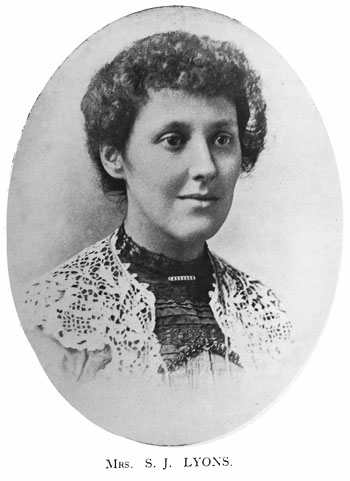
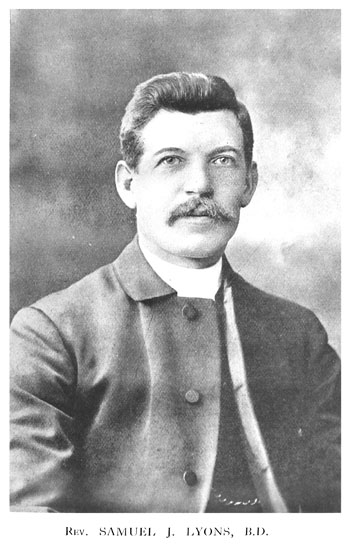
For several years before his death, Mr. Lyons was in failing health. The strain of strenuous service told heavily upon him at a comparatively early age. He retired from the active duties of the ministry less than a year before the end came.
When the last call and summons came to him, he was in the midst of his people, and in the presence of One Whom he knew as Saviour and Master and Lord. He was in the Church on Communion Sabbath, taking part in the worship of that solemn day. He became suddenly ill during the Service and was unable to partake of the elements. He remained until the close of the observance of the Sacrament, and was then conveyed to the Manse, where he passed peacefully away two days later. He died on Tuesday, 7th May, 1929, aged sixty years.
The funeral took place on Thursday, and was attended by a sorrowing people. His mortal remains were borne from the Manse to the Church, after a brief, sad service in the home where those who were nearest and dearest to him were met together. In the Church the service was continued, and the Rev. Hugh F. Kirker, M.A., of Ballyfrenis, addressed the assembled congregation of mourners. Mr. Kirker's words so well befitted the occasion, and so worthily estimated the life and labours of Mr. Lyons, that they are here repeated in full.
He said: " As a very near neighbour of Mr. Lyons, and as one who was privileged to enjoy his friendship during the whole period of his ministry in Millisle, it falls to me to address a few words to you on this solemn occasion. I should have been glad had this duty been undertaken by some other member of the Presbytery, who could have given more adequate expression to the feelings of Millisle and Ballycopeland Congregation, and of his brethren in the Presbytery. I should have been grateful if someone had spoken here to-day, who could have dealt more worthily with Mr. Lyons' life and work. One qualification for my task however I claim to possess, and that is, that no one could speak of Mr. Lyons with a higher appreciation of his character, or out of a deeper sense of the loss that we all have suffered. When thinking over matters like these at times in the past it had occurred to me that it might fall to Mr. Lyons to discharge in my case that very duty which to-day I undertake for him. An All-wise Providence has ordered it otherwise, and now I should like to speak of him as I know that he, in the exercise of that spirit of Christian charity and kindness which he ever manifested in what he thought and said of others, would have spoken of me.
The occasion which brings us together in this place to-day is the most solemn and in some of its aspects the most sorrowful of which we can have experience. We feel the presence of Death in our midst. A loved, an honoured, and a useful life has been brought to what may be considered an early close. This day a home has been left desolate, a congregation has been bereft of a beloved pastor and teacher, and the circle of his friends has been rendered poorer by his loss. 'Man goeth to his long home, and the mourners go about the streets.' Sorrow at such a time is inevitable. It is natural. It is right. A sadder sight than that of tear-dimmed eyes would be to see unfeeling hearts incapable of sorrow -- hearts that cannot be touched by sympathy with the grief of others. 'We are not wood, we are not stones,' but men and women who can feel our own loss and the sorrow of others. Jesus wept by the grave of Lazarus. He looked around Him and saw the weeping sisters and their friends. He saw the tomb where lay the dead body of his friend. He saw the havoc that death had wrought, and He wept and was troubled. We read a little further and we are told that Jesus lifted up His eyes. He looked up to Heaven, and the first words that fell from His lips were, 'Father, I thank Thee.'
In our darkest moments, and in our deepest sorrow, if we rightly consider the matter we have cause for giving thanks. So this day we thank God. We thank Him for the life which He gave, and which in His own time and way He has taken. The giving and the taking are both of God, blessed be the name of the Lord.'
God's best guts to the world have been men and women -- good men and good women -- whom He has sent into it. When His Son would save and bless the world He became the Man, Christ Jesus. We think very gratefully at this time of the life of our brother Samuel Joseph Lyons. He was born sixty years ago. His father was Mr. William Lyons, of Loughermore, County Londonderry. He was brought up under the ministry of the Rev. W. J. D. Williamson, M.A., of Banagher Presbyterian Church, a highly cultured man, and an able preacher. Looking forward from the beginning to the work of the ministry, Mr. Lyons pursued his studies, first ay=t a local school, then at a school in Londonderry, and afterwards at M'Crea-Magee College. Having finished his curriculum in 1892 he was at the early age of twenty-three years licensed by the Presbytery of Glendermott to exercise his gifts as a candidate for the Christian ministry. Towards the close of the same year he was called to the united Congregation of Scarva and Poyntzpass, and in January, 1893, he was ordainedthere. After a brief ministry of little more than a year he was called to become minister of Millisle, vacant through the death of the Rev. John M'Auley. He was installed in this Church on the 23rd of January, 1894, and thus at the time of his death he had completed more than thirty-five years' service here.
You, the members of this congregation, who have so long sat under his ministry, many of you having known no other minister in Millisle, know better than I can tell you the character of the ministry exercised by him in this place. He was a man of deep, strong, and true feeling, and possessed of much kindness of heart. The Congregation of Millisle had ample proof of this in the days of his health and strength; and in later years, when his health was impaired, and he required change and rest, his heart never left Millisle and very soon he was back again in your midst.' He had a high ideal of the office of the Christian ministry, and he was most conscientious in the discharge of every duty. He gave of his best in the pulpit, always preparing diligently. He did not cease to be a student when he left college, but maintained his studies to the end. He was attentive to the visitation of the congregation. In the homes of his people he was always welcome, especially in seasons of trouble, and at such times he was found to be a true friend and comforter. The subject of his preaching and of his conversation was the power of the Gospel of the Grace of God to change the heart and to reform the life, and his teaching was enforced by a life in agreement therewith.
In the circle of his friends his company was always highly valued. He had his own point of view on most matters. He could hold tenaciously to his opinions. He was gifted, too, with a racy way of expressing his ideas that made him a most interesting companion. I ever found him a good neighbour and most faithful friend, being willing to help, and most appreciative of any little service rendered.
As a congregation you showed him on mere than one occasion how highly you appreciated his worth and his services. And quite lately, when naturally you were much taken up with his successor, your new minister, you did not forget your senior pastor. You honoured him with a gift which was very gratifying to him, and not only to him but to all interested in him and in the Congregation of Millisle and Ballycopeland.
The harmonious settlement of Mr. Kilpatrick was also gratifying to him, and the closing months of his life were brightened by the society and the ministrations of his young colleague.
The manner of Mr. Lyons' passing was such as any minister might desire. It is true he was not allowed to die in harness, as some wish to do. But his last conscious moments were spent in the midst of his worshipping people. All the week before that Sabbath he had been looking forward to the Communion Service. He attended the pre-Communion Service on Friday evening. It was conducted, as on so many former occasions, by his friend from student days, the Rev. Robert Andrews, of Donaghadee. At the close he expressed his warm appreciation of the entire service, saying that 'the right note had been struck.' The Sabbath he had been looking forward to with such pleasure arrived. The Communion Service had begun, and there was that solemn interval of silence when the bread and wine pass from hand to hand. It was then that the finger of God touched him, and a voice spake in his ear: 'Friend, come up higher, even into the presence of the King.' He did not partake of the elements. He passed from the table, but it was to sit down at the table on high, and see, not the poor symbols we use, but the Lord Himself. Such was the close. But it was not the close. For the departed one it has been the beginning rather than the end. And here his name will long be remembered, and even when the name of him whom we mourn is forgotten, that will not be the ending on earth. When his name is no longer remembered, his influence will still continue its blessed and ever widening work.
Mr. and Mrs. Lyons had the satisfaction of seeing their two boys grow up to promising young manhood. A short time ago the elder son, Norman left for South Africa. It was very pleasing to his father to hear of the kind reception he met with there from former members of Millisle Congregation, and from Mrs. M'Coy, the daughter of his close friend of former days, the Rev. Dr. Megaw, at one time minister of Carrowdore.
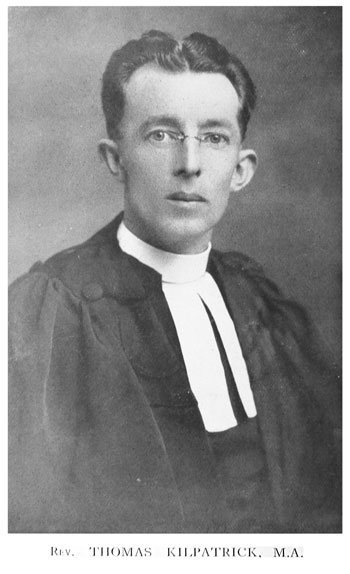 In the Millisle Manse, during Mr. Lyons' occupancy of it, there have been lights and shadows. In the dark shadow in which it is enshrouded to-day she sits lonely in the presence of her grief who for many years has been his true and loving partner and helper in every good work, and in later days his tender and devoted nurse. Into the presence of that sorrow we do not further intrude than to offer our heartfelt sympathy. It is our earnest prayer that in her time of trial the Eternal God may be her Refuge, and the Comforter of all the sorrowing relatives and friends.
In the Millisle Manse, during Mr. Lyons' occupancy of it, there have been lights and shadows. In the dark shadow in which it is enshrouded to-day she sits lonely in the presence of her grief who for many years has been his true and loving partner and helper in every good work, and in later days his tender and devoted nurse. Into the presence of that sorrow we do not further intrude than to offer our heartfelt sympathy. It is our earnest prayer that in her time of trial the Eternal God may be her Refuge, and the Comforter of all the sorrowing relatives and friends.
We have just left the home that has been desolated by death, but we have heard the words, 'Let not your hearts be troubled.' And now we think of another home where death shall never cast its shadow. We tarry for a little while, as is meet in the earthly sanctuary, very dear to him, and very dear to you. To this place of worship you come on some of the saddest occasions of your lives. But we think of the City on high where one who saw so much beheld no temple because the Lord God Almighty and the Lamb are the Temple thereof. In that place there are no such gatherings as this, but fulness of joy for evermore. Presently we pass out of this place to perform our last sad duty. But as we stand by the open grave in the shadow of this Church, and look down upon the casket which contains the mortal remains of our departed friend we shall think of another sepulchre. Into that other grave the sorrowing friends looked on that early Sabbath morning and behold it was empty! And there were those present who asked, 'Why seek ye the living among the dead? He is not here, He is risen. 'O death, where is thy sting? O grave, where is thy victory? Thanks be to God which giveth us the victory through our Lord Jesus Christ. Therefore, my beloved brethren, be ye stedfast, unmoveable, always abounding in the work of the Lord, forasmuch as ye know that your labour is not in vain in the Lord.' 'And I heard a voice from heaven saying unto me, Write, Blessed are the dead which die in the Lord from henceforth: Yea, saith the Spirit, that they may rest from their labours; and their works do follow them.'"
Rev. THOMAS KILPATRICK. M.A.
The writer of this brief account of the Congregations of Millisle and Ballycopeland and their Ministers is the seventh minister of Millisle. He is the second minister of the united Congregation of Millisle and Ballycopeland. He is the eldest son of the late William Kilpatrick, of Cabra, Tanderagee, Co. Armagh, and Annie Elizabeth, youngest daughter of the late Robert Reid, of Tarson, Portadown. He was educated at the Intermediate School, Portadown; Trinity College, Dublin; and Assembly's College, Belfast. He was licensed by the Presbytery of Dublin on 2nd December, 1919. On 16th December, 1919, he became assistant to the Rev. W. J. Bruce-Little, in Fermoy, Co. Cork, and in Lismore, Co. Waterford. He returned from the South on 7th September, 1920, and on 1st November, 1920, he became assistant to the Rev. Samuel Cochrane, B.A., of Sinclair Seamen's Church, Belfast. Whilst thus engaged he received a call from the Congregations of Third Rathfriland, which he accepted. He was ordained as minister of Third Rathfriland Congregation by the Presbytery of Rathfriland, on 28th June, 1921. On 10th January, 1927, he resigned his charge of Third Rathfriland, having accepted a call from the Congregation of Claggan. On 12th January, he was installed as minister of Claggan by the Presbytery of Tyrone. After a short ministry of one year and eight months in Claggan he resigned his charge of the congregation, having accepted a call from the united pastorate of Millisle and Ballycopeland. He was released from the pastoral oversight of Claggan on 3rd October, 1928, and on the following day he was installed by the Presbytery of Ards in Millisle and Ballycopeland. He continues to minister to this united congregation.

